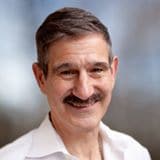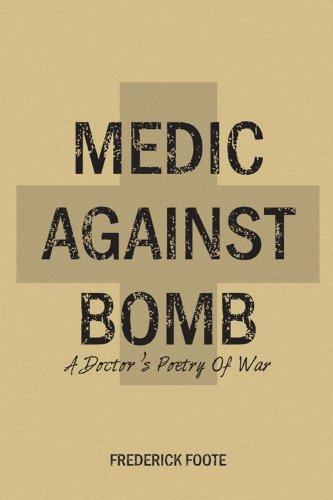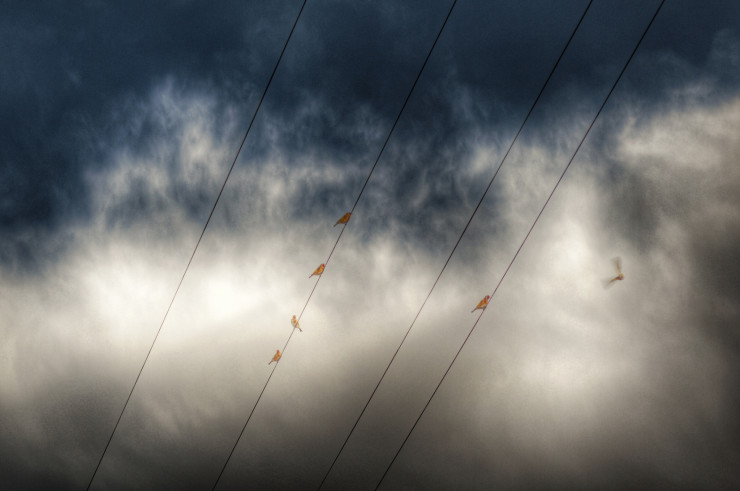Maureen Doallas spoke with Fred Foote, a retired Navy Medical Corps physician who served in the 2003 Iraq War and currently leads the Warrior Poetry Project at Walter Reed National Military Medical Center in Bethesda, Maryland. He also is the author of Medic Against Bomb: A Doctor’s Poetry of War (2014), winner of the Grayson Books Poetry Prize. Foote’s poems have appeared in numerous periodicals and journals, including Commonweal, JAMA, and The Progressive.
You said in an interview with the National Endowment for the Arts that “poetry’s been my first love ever since I was a kid.” How would you describe your experience of poetry and its role in your life before joining the military?

Who were and are your favorite poets?
Whitman and Frost were favorite poets when I was young, and still are today.
Did you write and publish poetry during your medical studies?
I started publishing poetry in 1995. My first published poems were about medicine, and my patients during my residency at Yale.
Throughout the nearly three decades you served in the Navy Medical Corps, you wrote poetry, especially while aboard the “USS Comfort” during the U.S. war in Iraq. What made the Iraq War so powerful a catalyst for poetry writing?
I think the public needs to know about the realities of the war, because we are the Nation. What America does is our responsibility. [My] book tries to bridge the gap between military and civilian. When civilians understand the Wounded Warrior experience, they feel more empowered to help the veteran.
What was “the stuff” of the poems you wrote, and how did writing the poems benefit you personally at the time?
I wasn’t able to write while on the “Comfort” war mission. The strain of doing war medicine was too great. Once I got back to the States in 2004, I was able to start writing about what I’d seen. Writing about the American and Iraqi patients was cathartic, because it allowed me to take a stand against the disaster of war.
Did you share what you were writing? If so, what were others’ reactions?
Many of the poems celebrate the deeds of particular healers on the ship and elsewhere. Some of [the subjects of the poems] have the poems up on their walls.

Just the need to speak the truth, and how art and healing and reality are all connected.
If you had to describe your collection in 10 or fewer words, what would those words be?
My “pitch” at books fairs: Award-winning poetry about our Wounded Warriors and military healers.
You told your NEA interviewer, “A poem comes as a gift, so I must earn it.” How do you, as poet, “earn” your words?
By hard work—both exacting writing and exacting performance—and by taking risks.
I always say the poems from memory. I spend about three hours rehearsing for every hour of performance.
Do you have an established writing routine or write poetry daily? What inspires a poem?
I generally write each day.
William Stafford, an American master, used to demand of himself a new poem each day. When asked, “What if you’re no good that day?” he replied, “Then I lower my standards!”
What is your idea of a successful poem?
Invention, movement, and passion. And personal uniqueness—a sense that only I could have written that poem.
[. . .]
The day you brought the scarves down
they pressed your hands
and those not maimed
tied scarves around the heads
of friends who couldn’t move
(silk to die for
new to those
dust-colored homes
only the F-18s
had deemed worth bombing)
Those who thought
They could no longer weep
wept to feel the touch
of simple cloth
And they were once again sacred women.
~ Excerpt from “You Made the Iraqis Their Scarves”
in Medic Against Bomb
Foote wishes to make clear that as a retired military veteran and not a federal employee, nothing he shares with readers should be considered to represent the views of the U.S. Government.
Photo by Andy B, Creative Commons license via Flickr. Interview by Maureen E. Doallas, author of Neruda’s Memoirs: Poems.
For further reference:
- Frederick Foote Website
- Selection of Fred Foote’s Iraq Poems
- Medic Against Bomb Website
- Fred Foote on Facebook and Twitter
- Fred Foote National Endowment for the Arts Interview
- The Green Road at Nature Sacred
In Part 2, Foote discusses his holistic approach to medicine and his Warrior Poetry Project. In Part 3, he talks about another initiative, the Green Road Project, which takes advantage of nature’s healing properties.
_______________________________________________

“How to Write a Poem is a classroom must-have.”
—Callie Feyen, English Teacher, Maryland
- Persecuted Poets: Hearing the Voices Beyond Our Borders - November 30, 2016
- Writing with Matisse in Mind - October 26, 2016
- Healing with Poetry: Interview with Fred Foote (Part 3) - September 10, 2015

Maureen says
Thank you for allowing me the opportunity to publish here my interview with Fred Foote. He lives in the area, so I am hoping to meet him and hear him read.
L.L. Barkat says
I’ll bet he’s a great “reader” (he memorizes the poems?!)
It struck me that he couldn’t write during the trauma. I think it’s good when we understand that writing can have a *time,* and it doesn’t mean that our writing is gone just because it won’t come during certain seasons.
Of course I am with him regarding the healing power of art. I wonder, sometimes, if we couldn’t use art more on the front side, to prevent the hurts in the first place. (I suppose that is sort of a butterfly’s burden question 😉 )
Maureen says
On the “when” of writing:
I think sometimes getting some distance helps make writing sharper, though it then also becomes itself refigured through an act of remembering. For the veterans with post-traumatic stress disorder who are in Fred’s workshops, to remember is to re-suffer the pain, so the pain becomes something akin to the IED, hidden and waiting to explode. The healing comes when the heart of the pain is located, allowed to find its way into words, examined in all its facets and finally let go to be transformed into art.
Sandra Heska King says
I’ve followed the link to Amazon. Some powerful poems there. As a nurse, of course, I’m especially in any poetry written by healers. Thanks for this, Maureen. I’ll be looking forward to the next parts. And I may need to add yet another book to my sagging shelves. 🙂
Maureen says
I think I can say that Fred is tireless when it comes to vets, and he has found such marvelous ways to use poetry and nature to help heal those with traumatic and devastating war experiences. (I’d love to be able to sit in on one of his Walter Reed workshops.)
I urge you to get the collection. It’s excellent. I’ve read several of his poems several times, moved by the depth of feeling conveyed.
Fred’s active on the speaking circuit, so I’m keeping watch for his next appearance locally.
Sandra Heska King says
I used to be able to blame my book spending on Laura Boggess. Now it’s you. 😉
I wonder if we can find Fred on youtube…
Maureen says
Yes, here’s his YouTube link (I must have forgotten to include it):
https://www.youtube.com/channel/UCun0egQxuwGsyqACOB0bnlQ
Sandra Heska King says
Thanks. I haven’t explored all the links you did include yet, though. So maybe one of them would have led me there. 🙂
Sandra Heska King says
That’s “especially interested in and touched by any poetry written by healers…” 😛
Megan Willome says
Thank you, Maureen. We get a lot of Wounded Warriors visiting our town. This collection by Foote gives me something to think about.
Maureen says
Thank you for reading Part 1, Megan.
While I’m not a big fan of the use of the word “warrior”, I think it’s marvelous that Fred Foote has gotten a poetry program inside Walter Reed. The work he is doing there is so important.
Dolly@Soulstops says
Maureen,
Thank you for this piece and for highlighting Fred Foote’s poetry and the healing power of writing. Reading this reminded me of what I’ve read via a few of Dr. Daniel J. Siegel’s books on how writing about traumatic events heals integrate the event in our brains by connecting both sides of our brain …pardon my less than technical paraphrase of what Dr. Siegel wrote 🙂